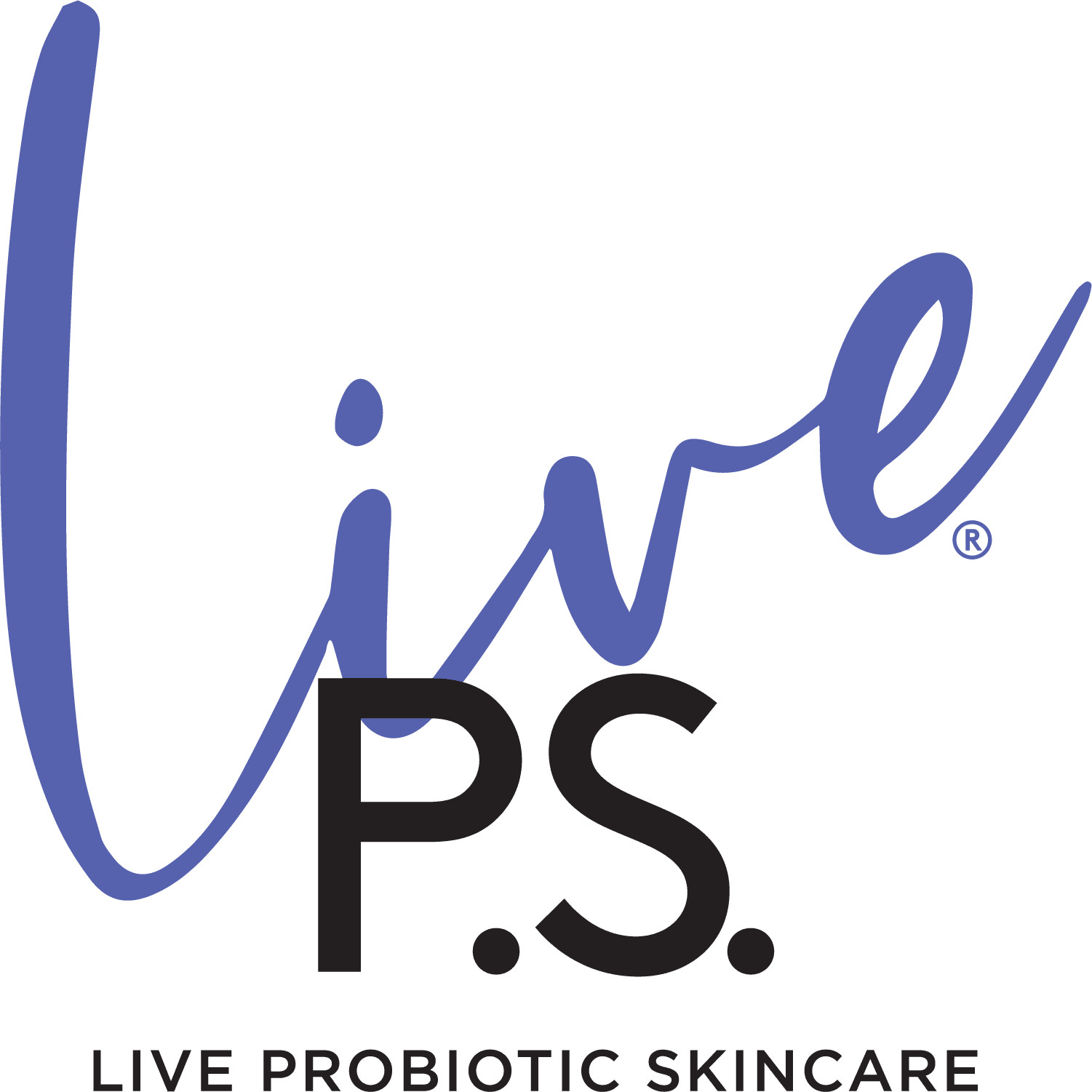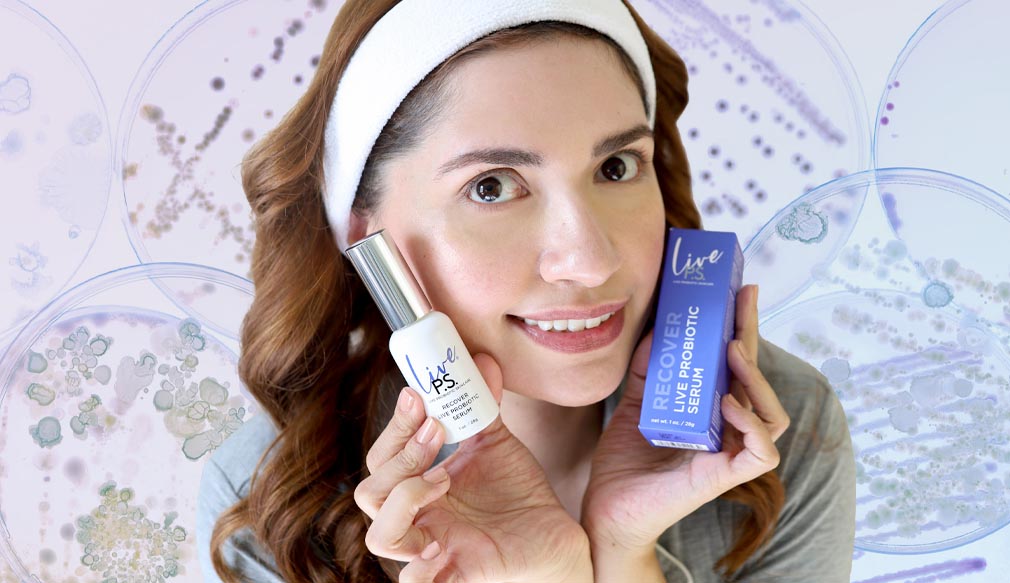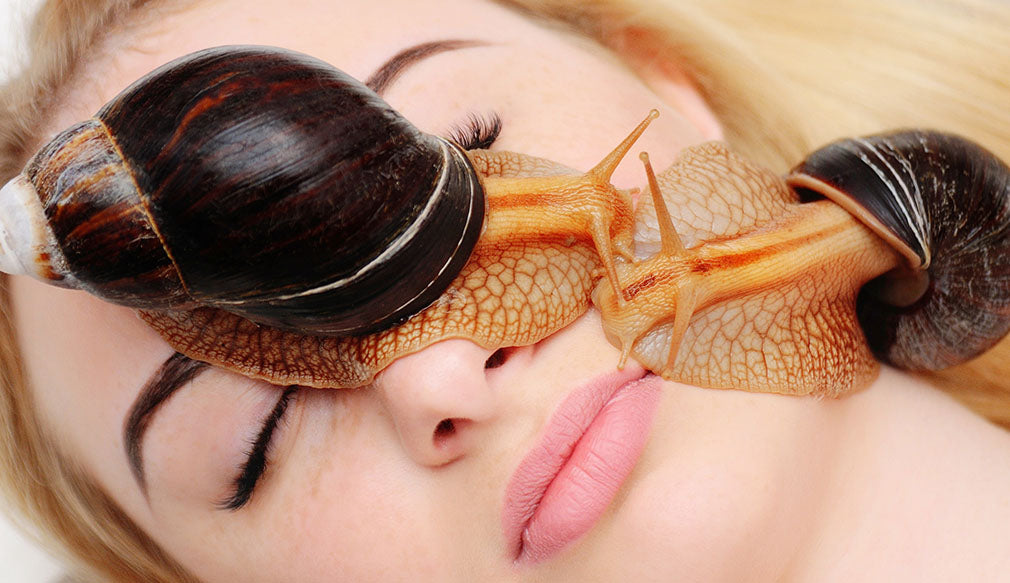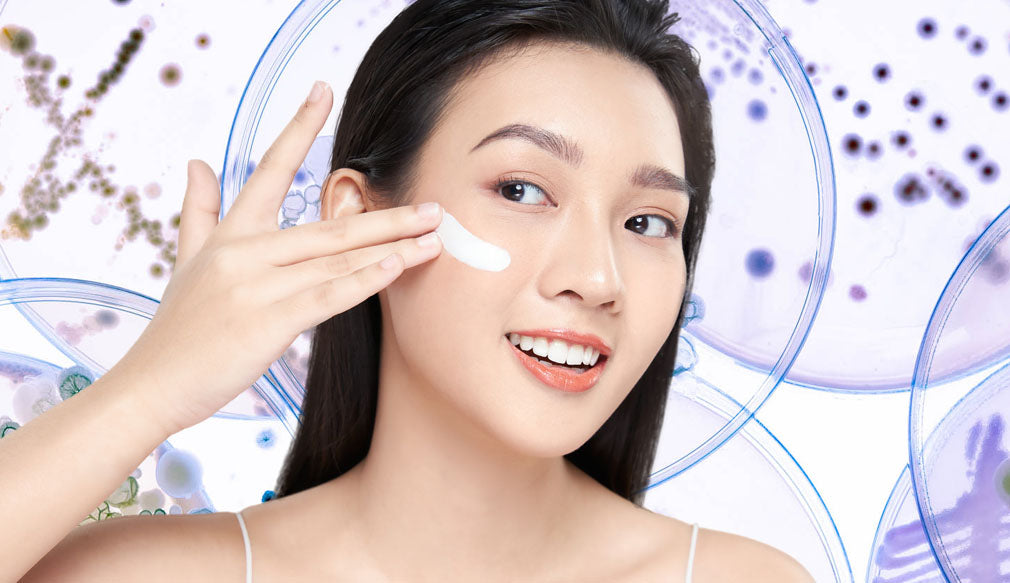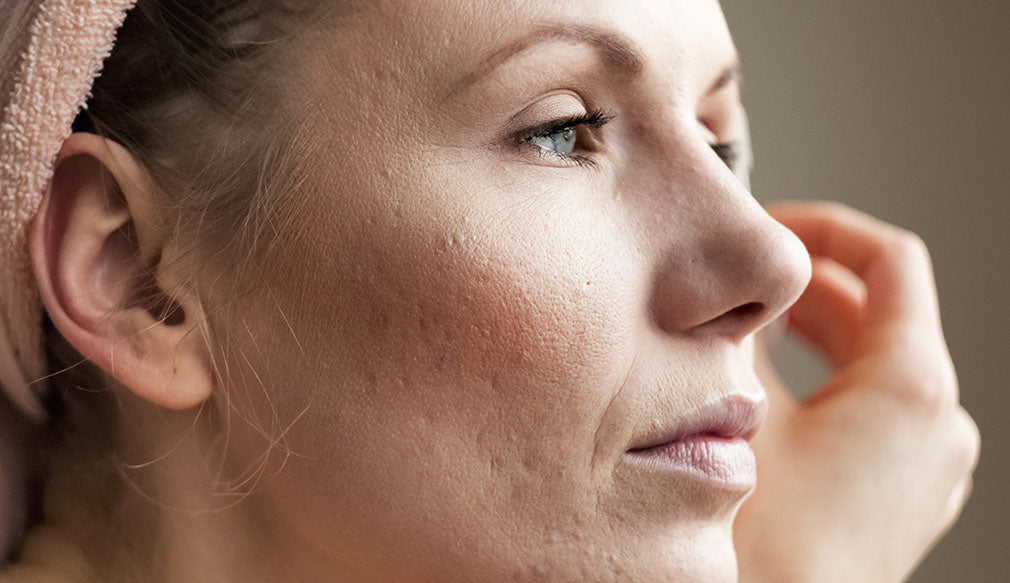
Ageless Acne: Navigating Breakouts in the Teenage Years and During Menopause

Navigating Breakouts in the Teenage Years and During Menopause
Acne is a skin condition that most people associate with the turbulent teenage years. However, it can also resurface during another major life transition: menopause. While these two life stages may seem worlds apart, they share a common thread when it comes to acne. This is due to health of one’s skin microbiome, a complex ecosystem of bacteria and microorganisms living on our skin's surface. Both teenage acne and menopausal acne can significantly influence the delicate balance of bacteria found on the skin.
In the context of acne, the skin microbiome often undergoes dysbiosis, where there's an overgrowth of certain harmful bacteria and a reduction in beneficial ones. This imbalance can exacerbate inflammation and the formation of acne lesions. In this blog, we'll explore why acne occurs in both teens and menopausal women and offer insights on managing it effectively.
Teenage Acne: Hormones in Overdrive
Acne during the teenage years is largely due to the surge in hormonal activity that occurs during this developmental stage. Puberty heralds a significant increase in androgens, such as testosterone, in both males and females. These hormones stimulate the sebaceous (oil) glands in the skin to produce more oil. When this excess oil mixes with dead skin cells and clogs hair follicles, it creates an environment conducive to acne development. Additionally, the adolescent skin undergoes various changes, including increased shedding of skin cells and an altered composition of skin oils, further contributing to the likelihood of acne breakouts. Genetics, diet, and environmental factors also play critical roles, but hormonal fluctuations are the primary driving force behind the prevalence of acne in teenagers.
Types of Teenage Acne:
- Comedones: Blackheads and whiteheads.
- Papules and Pustules: Red, raised bumps filled with pus.
- Cysts and Nodules: Deep, painful lumps under the skin.
Skincare Tips for Teens:
- Gentle Cleansing: Use a mild, non-comedogenic, microbiome-friendly cleanser like the Live P.S. Recharge Revitalizing Cleanser. Tip: This cleanser is ideal for sensitive skin and can be used as a mini mask for an additional boost to sluff off dead skin cells and improve cellular turnover.
- Topical Treatments: Use a topical LIVE probiotic therapy daily. By using a serum like, the Live P.S. Recover Live Probiotic Serum you are working with the skin to mend and thrive naturally. This includes beating out the pesky bacteria that causes acne, helping to regulate oil production, increasing cellular turnover and more. To learn more about how topical LIVE probiotics work check out this quick animation - Click Here.
- Avoid Picking: Popping pimples can worsen inflammation and scarring. Yes, this likely sounds like a no brainer, but it’s so tempting to pick. It’s important to trust your skin’s process. That bacteria that comes out of the pimple can easily spread on the skin and cause more acne.
Menopausal Acne: A Surprising Comeback
Acne's reappearance during menopause may seem unexpected, but it's primarily attributed to the significant hormonal shifts occurring in a woman's body during this phase of life. The drop in estrogen levels often lead to changes in the skin's pH and moisture levels, affecting the skin microbiome's composition as well as thinning of the skin. Though estrogen levels are dropping many do not realize that androgen levels remain relatively stable, which is a big part in the skin microbiome upset. Androgens, including testosterone, are male hormones found in both men and women, albeit in smaller quantities in females. These androgens can stimulate the sebaceous (oil) glands in the skin, leading to an increase in oil production. This hormonal imbalance, coupled with other factors like stress and genetics, can create the perfect environment for acneic bacteria to resurface in menopausal women, often manifesting typically along the jawline, chin, and neck.
Understanding these intricate relationships between the skin microbiome, acne, and menopause is crucial for developing targeted skincare strategies to address these specific concerns effectively.
Types of Menopausal Acne:
- Hormonal Acne: Typically appears along the jawline, chin, and neck.
- Inflammatory Acne: Can be more severe and painful than teenage acne.
Skincare Tips for Menopausal Women:
- Balancing Act: Hormone therapy may help in some cases but discuss this with a healthcare provider.
- Gentle Cleansing: Use a microbiome-friendly cleanser to avoid drying out the skin. Menopause can also make skin more sensitive, so it’s important to use a product that is dermatologist-tested and approved for sensitive skin like the Live P.S. Recharge Revitalizing Cleanser. This product also helps with elastin and collagen production.
- Support Your Skin Microbiome with a Topical Probiotic: This is the most important step to happier skin. By using a topical LIVE probiotic product like Live P.S. Recover Live Probiotic Serum, you are supplementing the beneficial workforce your skin needs to mend and thrive naturally. This is done through the production of postbiotic metabolites like AHA, BHA, PHA, ceramides, vitamins like vitamin A (retinol), minerals and more. The magic of this product is that it takes the guesswork out of what to apply to the skin because it works with the skin to do what it was designed to become balanced.
Additional Common Factors Contributing to Acne in Both Teens and Menopausal Women:
- Stress: High stress levels can trigger hormonal fluctuations that worsen acne in both age groups.
- Diet: A diet high in refined sugars and dairy can exacerbate acne in some individuals. Teens and menopausal women should focus on a balanced, low-glycemic diet.
- Skincare Products: Heavy, pore-clogging products can contribute to acne in both age groups. Look for non-comedogenic, skin microbiome-friendly options like Live P.S.’s skincare products.
- Lifestyle Habits: Factors like smoking and excessive sun exposure can aggravate acne and should be avoided.
While acne in teens and menopausal women may seem like unexpected companions on the journey of life, the commonality lies in hormonal fluctuations and the havoc it causes within the skin microbiome. By understanding the root causes and adding topical LIVE probiotics like the Live P.S. Recover Live Probiotic Concentrated Serum daily, both groups can effectively manage and reduce acne breakouts, ensuring their skin remains healthy and vibrant throughout life's transitions.
Recommended Products
Live P.S. Recover Live Probiotic Serum: This serum teams up with your skin's microbial buddies to reduce redness, irritation, and inflammation. Together, they create postbiotic goodies like vitamins A and C, peptides, antioxidants, and ceramides. Shop Now
Live P.S. 3-Step Kit: For those who love simplicity, this kit has everything your skin needs to shine. It brings harmony to your skin's microbial world, taming current acne and making future flare-ups less intense and frequent. The kit includes Live P.S. Recharge Revitalizing Cleanser, Recover Live Probiotic Serum, and Protect Daily Defense Moisturizer, each playing a role in your skincare routine.
- Prep for Nighttime Rejuvenation: Start by cleansing your face with prebiotics and probiotics, waving goodbye to makeup and germs.
- Recharge with Good Bacteria: The serum introduces live probiotics to your skin, soothing inflammation and standing as a shield against future breakouts.
- Nourish and Safeguard: Keep your skin happy with prebiotics and probiotic goodness while preventing excess oil.
A Friendly Reminder
When introducing topical LIVE probiotics into your routine, your skin might experience a "purge." This individual journey is linked to your unique skin microbiome. If things seem to worsen initially, fear not – it's a normal part of the skin clarification process. Keep the faith and remember that healthy, glowing skin is just around the corner. Please note, though: if you encounter a burning sensation, discontinue use immediately.
To learn about the science behind acne and topical probiotics – check out this blog.
FAQ – All About Acne and Topical Probiotic Therapy
What are common factors contributing to acne in both teens and menopausal women?
Common factors contributing to acne in both age groups include stress, diet (particularly high refined sugars and dairy), skincare products that may be heavy or pore-clogging, and lifestyle habits like smoking and excessive sun exposure.
What are some skincare tips for managing teenage acne effectively?
Effective skincare tips for managing teenage acne include gentle cleansing with a mild, non-comedogenic cleanser, using topical treatments like LIVE probiotic therapy, and avoiding picking at pimples to prevent inflammation and scarring.
Why does acne sometimes resurface during menopause?
Acne's reappearance during menopause is primarily due to significant hormonal shifts, including a drop in estrogen levels and relatively stable androgen levels. These hormonal changes can stimulate sebaceous glands, leading to increased oil production and acne.
What are the types of acne that menopausal women typically experience?
Menopausal women often experience hormonal acne, typically appearing along the jawline, chin, and neck, as well as inflammatory acne, which can be more severe and painful than teenage acne.
How can menopausal women support their skin microbiome to manage acne?
To support their skin microbiome, menopausal women can use microbiome-friendly skincare products like the Live P.S. - Recharge Revitalizing Cleanser and topical probiotics such as the Live P.S. - Recover Live Probiotic Serum.
How does the skin microbiome play a role in acne during both teenage years and menopause?
The skin microbiome is a complex ecosystem of bacteria and microorganisms on the skin's surface. Dysbiosis in the skin microbiome, with an overgrowth of harmful bacteria and a reduction in beneficial ones, can exacerbate inflammation and the formation of acne lesions in both teenagers and menopausal women.
What is the role of topical LIVE probiotics in managing acne for both age groups?
Topical LIVE probiotics like the Live P.S. - Recover Live Probiotic Serum work with the skin to mend and thrive naturally. They help regulate oil production, increase cellular turnover, and support a balanced skin microbiome, making them a valuable addition to skincare routines for both teenagers and menopausal women with acne concerns.

